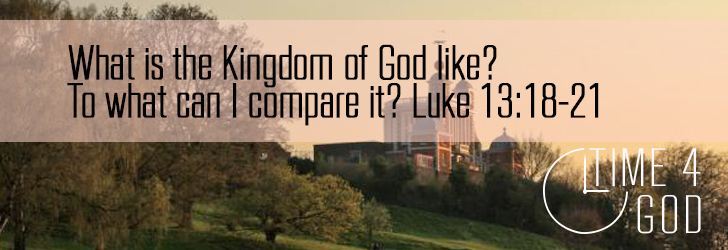The Kingdom of God
“What is the Kingdom of God like? To what can I compare it?” Luke 13:18-21

What is the Kingdom of God like? To what can I compare it? Luke 13:18-21
This is one of the most earthy rhetorical questions that Jesus poses in the Gospels. We can imagine that someone in the crowd, some innocent, full of the excitement of Jesus’ words, has asked him something like: “Teacher, what is the Kingdom of God? What is it like?” Jesus’ responses would have spoken very clearly to the people of that time. Most of them would have been people who labored on the land, working with the soil. They would have had to make their bread daily. They did not have grocery stores to go to and get neatly packaged loaves of bread. There may have been bakers in the towns, but most would have lived in the small villages and would have had to make their daily bread. A mustard seed and leaven were great analogies, then, for them to understand the Kingdom that Jesus was talking about.
[content-ad]
St. John Chrysostom, one of the early Church Fathers, reflected on the meaning of the Kingdom as it is being worked out here on earth. In his Homilies on the Acts of the Apostles, he writes: “Is there anything more ridiculous than a Christian who couldn’t care less about other people? Do not use your poverty as an excuse. The widow who put two coins in the Temple coffer (Mark 12:14) would rise up against you.” He goes on to say that we cannot use our social status, our ignorance, or our weak health as excuses not to be leaven in the world. He says: “If leaven does not cause the dough to rise, then it is not a proper raising agent.” That was a pretty powerful challenge to the Christians of his time, and it still is to we Christian believers today. Christ wants us to be the leaven in the world today. If we say that we are Christians, then there is no excuse that we can use not to be that leaven. If we do not act as leaven in this world, causing the “bread of this world” to rise, then we have not become a “proper raising agent” and that would be a great failure.
St. John Chrysostom ends his reflection with these words: “Do not say it is impossible to have a good influence on others, because if you are a real Christian, it is impossible that nothing should happen…To say that a Christian cannot be of any use to his neighbor would be a contradiction, like denying the sun its ability to give light and heat.” Let us pray, then, that God give us the grace to be the mustard seed, the worthy leaven that He wants us to be in and for the world. That is our calling. That is what it means to be a Christian. We are to be God’s mustard seeds, his leavening agents in this world. Amen!
SKM: below-content placeholderWhizzco for FHB

